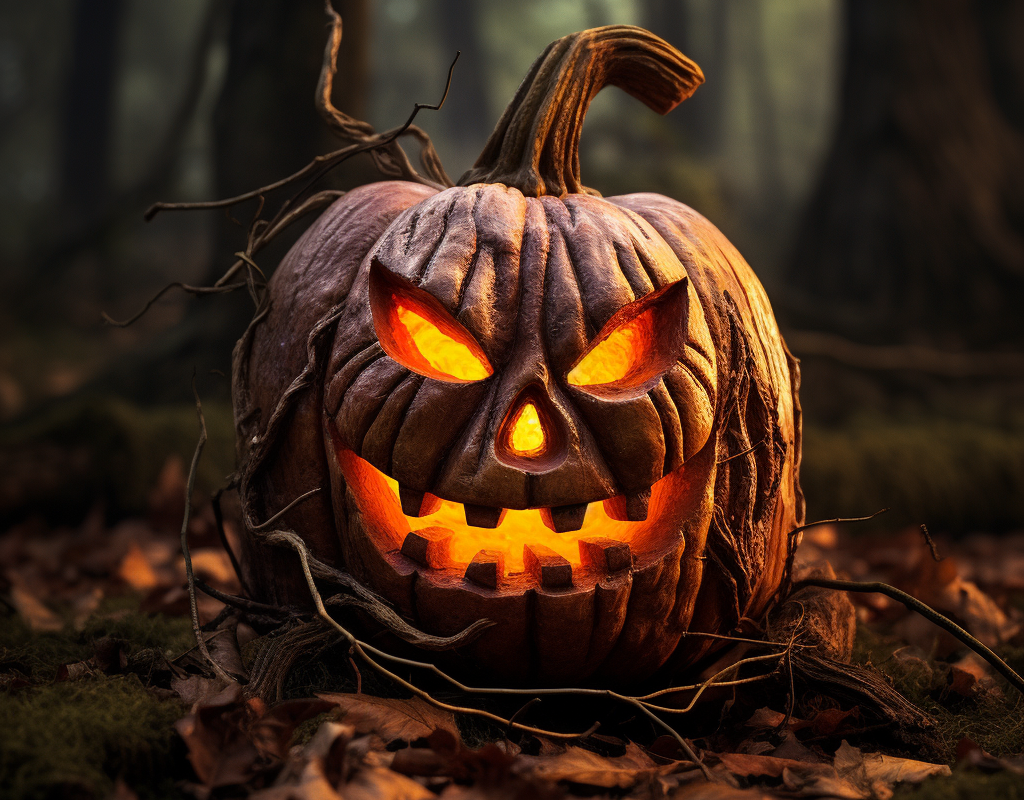Ah, the Jack-o’-Lantern – that glowing, grinning emblem of Halloween! Ever wondered how a simple carved pumpkin came to be such an iconic representation of this spooky holiday? Buckle up, because you’re in for a thrilling ride from the misty hills of Ireland to modern-day celebrations. You’ll dive deep into ancient Celtic legends, sail across the Atlantic with Irish immigrants, and even take a detour into pop culture’s brightest pumpkin-lit moments. And if you’ve ever mused about the artistic prowess behind those intricate carvings, there’s a treat (no tricks!) in store for you. Let’s illuminate the fascinating history and legends of the Jack-o’-Lantern. Ready to shine a light on this mystery?
The Mythical Origins of the Jack-o’-Lantern
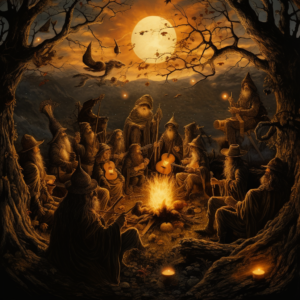
Diving into the mythical origins of the Jack-o’-Lantern takes us to ancient Celtic evenings steeped in mystery.
This wasn’t just a fun autumn pastime; it was a tradition deeply rooted in legends like Stingy Jack and Samhain celebrations. Ready to uncover the secrets behind your Halloween pumpkin? Let’s delve in.
Samhain: The Celtic Celebration of Endings and Beginnings
Dive into the roots of the Jack-o’-Lantern and you’re in the heart of Samhain, the ancient Celtic festival. This day, marking the end of harvest and the start of winter, held a deeper meaning. On October 31st, the barrier between our world and the spirit realm was believed to blur.
To the Celts, this was no trivial matter. Spirits, both benevolent and malevolent, roamed free. Lighting bonfires and wearing disguises helped ward off unwanted ghosts. They also carved turnips and beets, illuminating them as a protective measure and guide.
Today’s glowing porch pumpkins aren’t just festive decor; they’re nods to Samhain, bridging ancient tradition with contemporary celebration.
The Legend of Stingy Jack: The Tale Behind the Name
Ever pondered why it’s dubbed a “Jack-o’-Lantern”? Enter the legend of Stingy Jack. A crafty fellow from Irish folklore, Jack trapped the Devil in an apple tree, carving a cross to keep him there. Their bargain? Jack would free him in exchange for a promise: the Devil wouldn’t claim Jack’s soul upon his demise.
Fast forward to Jack’s end, and with neither heaven nor hell opening their gates, he was left wandering the earth. The Devil gifted him a lone burning coal for light. Jack nestled it in a carved turnip, becoming the original “Jack of the Lantern.” So, each glowing pumpkin you see? It whispers tales of Jack’s cunning and fate.
Spirits, Fairies, and the Need for Protection
The ancient Celts didn’t only fear spirits during Samhain; mischievous fairies were also a concern. On that mystical night, both entities blurred the lines between realms. Amid this symbolic darkness, fires became beacons against the supernatural. The illuminated turnip, our pumpkin’s ancestor, played a pivotal role: guiding benevolent souls and repelling the ill-intentioned ones.
Today’s glowing Jack-o’-Lantern isn’t just decor. It’s a nod to a time-honored tradition of shielding against the ethereal unknown.
From Carved Turnips to Pumpkins: The Evolution of the Lantern
You might find it intriguing that our beloved pumpkin wasn’t the original lantern-carving choice. In ancient times, especially in Ireland and Scotland, turnips were the go-to canvas. They were hollowed out, carved with grotesque faces, and illuminated to act as lanterns during the ghostly Samhain celebrations.
However, as immigrants brought their traditions to America, they found that pumpkins, native to the New World, were not only more abundant but also easier to carve. It’s a beautiful example of cultural adaptation: taking a cherished ritual from one’s homeland and tweaking it to fit new circumstances. Now, the pumpkin reigns supreme in our Halloween festivities, but its turnip predecessor lit the way.
The Journey from Ireland to America
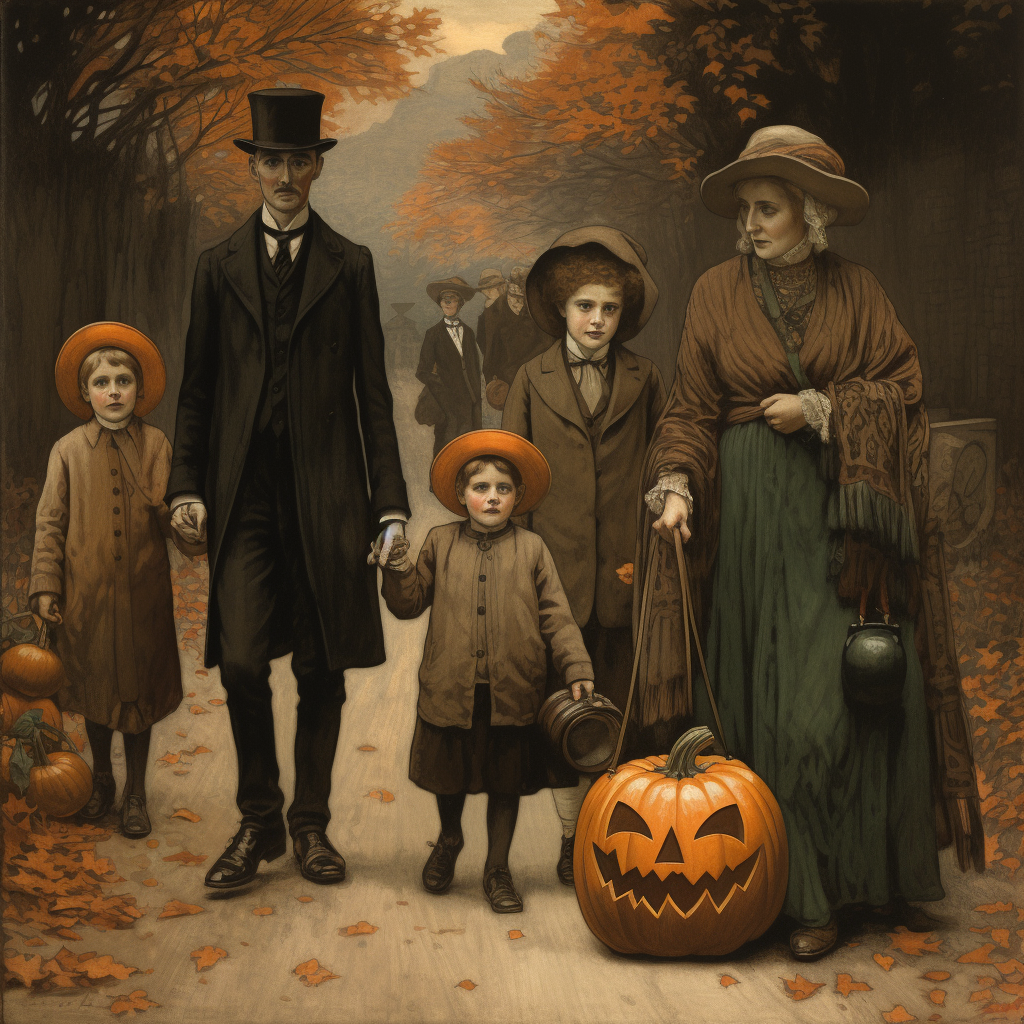
The story of the Jack-o’-Lantern is as much a tale of cultural migration as it is of mythical origins. As the Irish set sail for new shores, so too did their cherished traditions.
But how did a humble carved turnip transform into the glowing pumpkin spectacle we adore today? It’s a journey of adaptation, imagination, and a sprinkle of American flair. Ready to traverse this transatlantic tale? Let’s chart the course.
Irish Immigration: Spreading the Jack-o’-Lantern Tradition
The 19th century saw a significant influx of Irish immigrants to the United States, particularly during the Great Potato Famine of the 1840s. With them, they carried rich traditions, folklore, and rituals. One such practice was the carving and illumination of turnips during Samhain, a symbol of protection and remembrance.
In the vast stretches of the New World, these immigrants encountered the pumpkin. Larger, more pliable, and abundantly available, it quickly became the preferred medium for carving. The fusion of old-world tradition with new-world resources gave birth to the iconic Jack-o’-Lantern we recognize today.
Why Pumpkins Became the Preferred Choice in the U.S.
Picture this: Irish immigrants, accustomed to carving turnips, landing on American soil and discovering the versatile pumpkin. Native to North America, pumpkins offered several advantages. Their size made them a more substantial canvas, their flesh was easier to carve than the tough turnip, and their abundance, especially during fall, ensured they were readily available.
Moreover, pumpkins have a rich, orange hue that captures the essence of autumn like no other vegetable. When illuminated from within, they radiate a warm, inviting glow, making them visually striking during Halloween festivities. Their widespread cultivation in the U.S. also made them affordable and accessible.
So, while the roots of the Jack-o’-Lantern trace back to Celtic traditions and carved turnips, it’s the pumpkin that stole the show in America. Think of it as nature’s way of offering the perfect blend of functionality and aesthetics for a revamped Halloween tradition.
The American Adaptation: More Than Just a Legend
When the Jack-o’-Lantern tradition touched American soil, it underwent a metamorphosis. While its Irish origins centered around Stingy Jack’s legend and spirit warding, the American version started absorbing broader cultural nuances. Communities began crafting these glowing faces not only as protective symbols but as expressions of art, creativity, and communal bonding during the harvest season.
In this melting pot of traditions, the Jack-o’-Lantern became more than a mere legend. It symbolized the amalgamation of diverse cultures and a shared celebration. Next time you carve that pumpkin, remember you’re not just continuing an ancient ritual, but celebrating a unique blend of traditions that have found common ground in the U.S.
Symbolism and Superstitions Surrounding Jack-o’-Lanterns
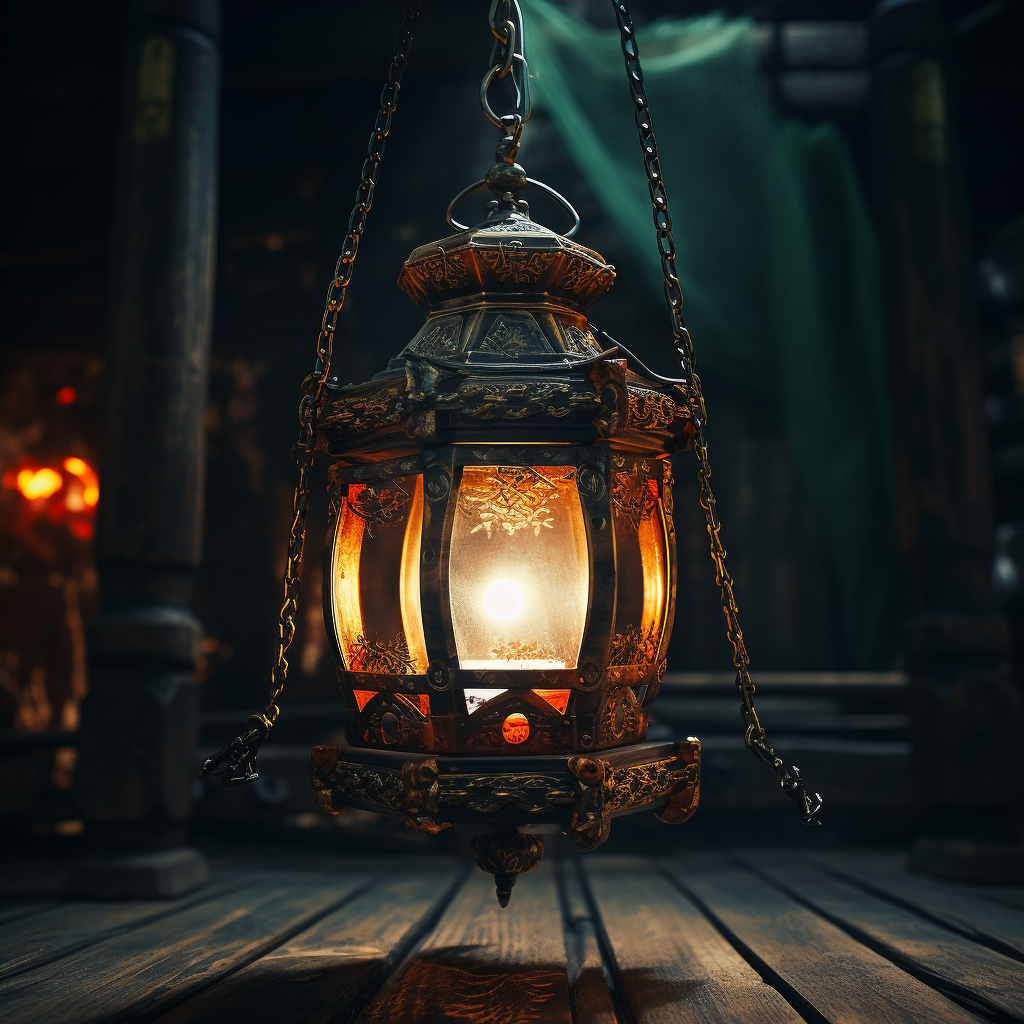
Symbolism and superstition – core threads in the fabric of the Jack-o’-Lantern’s tale. Beyond the candlelit grin lies tales of protection and otherworldly forces.
Why is that carved pumpkin more than just festive décor? Let’s dive into the depths and unmask the mysteries.
Guiding Lost Souls: A Beacon in the Night
The luminous glow of a Jack-o’-Lantern on a chilly October night serves a purpose deeper than mere decoration. Stemming from ancient beliefs, these carved lanterns were thought to guide lost spirits back to the otherworld, ensuring they wouldn’t linger and cause mischief. The soft, flickering light served as a beacon, leading spirits safely away from the living.
So, as you place your Jack-o’-Lantern on the porch this Halloween, you’re not just engaging in a festive ritual. You’re participating in a tradition steeped in the idea of guiding, protecting, and maintaining harmony between the realms of the living and the departed.
Warding Off Evil: Protective Powers of the Lantern
The Jack-o’-Lantern isn’t just about spooky faces and Halloween aesthetics. Originating from age-old Celtic customs, it’s believed that the glowing lanterns served a crucial role: to deter malevolent spirits. By carving menacing faces and placing a light within, these lanterns were strategically used to repel harmful entities, ensuring households remained shielded during the nights when the veil between worlds was at its thinnest.
Faces of the Jack-o’-Lantern: The Significance Behind the Carvings
Have you ever wondered why we carve those distinct faces on pumpkins every Halloween? These expressions aren’t just random choices. Historically, the carved faces on the Jack-o’-Lanterns mirrored the artist’s intent—be it to frighten off evil spirits, memorialize a lost soul, or convey a sentiment about the season. Over time, these designs have evolved and diversified, yet the core idea remains: each face tells a story, intricately intertwined with traditions and personal narratives.
The Craft of Carving: Techniques and Innovations
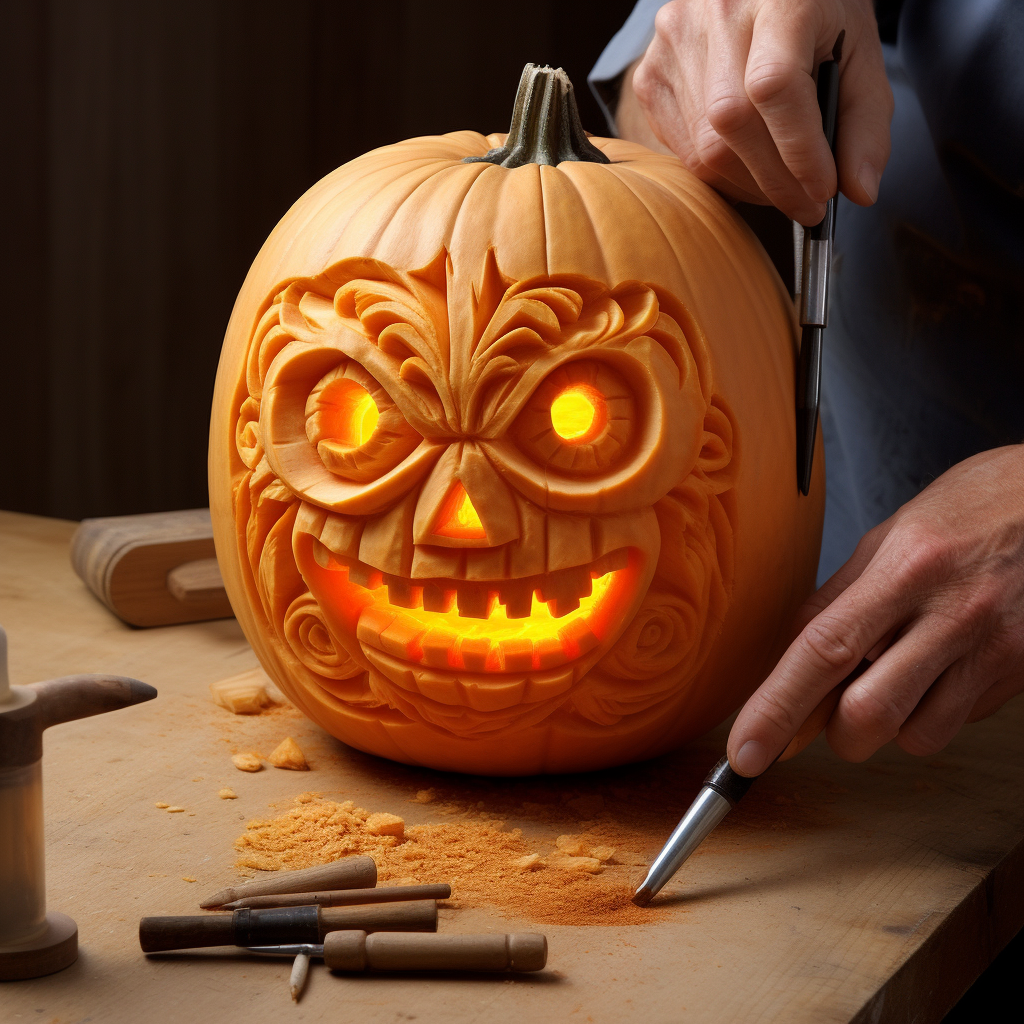
Carving the perfect Jack-o’-Lantern has journeyed from simple tools to modern gadgets. Curious about this blend of tradition and innovation in pumpkin artistry?
Let’s slice into the evolution.
Traditional Carving Methods of the Irish
Before the modern era of fancy carving tools and kits, the Irish relied on simpler methods to craft their Jack-o’-Lanterns. Using rudimentary knives and spoons, they skillfully hollowed out turnips, carving out faces that were equal parts eerie and expressive. The turnip, being harder and smaller than pumpkins, demanded precision and patience. Interestingly, the designs leaned towards more grotesque and exaggerated expressions, believed to be more effective in warding off spirits. So, next time you admire a beautifully carved pumpkin, spare a thought for those early artisans who set the trend with just basic tools and heaps of talent.
Modern Tools and Techniques
The art of carving Jack-o’-Lanterns has come a long way from the traditional knife and spoon method. Today, you’ll find a plethora of specialized tools, from serrated saws to intricate detail picks, facilitating designs that border on professional artistry. These advancements don’t just mean more detailed faces; they’ve enabled ambitious carvers to craft full-blown scenes, showcasing haunted houses, witches on broomsticks, and more. Moreover, with the dawn of online tutorials and templates, mastering these techniques has never been more accessible. This Halloween, the combination of modern tools and shared knowledge promises to deliver some of the most jaw-dropping lanterns the world has ever seen.
Safety First: Tips for a Secure Carving Experience
Carving Jack-o’-Lanterns is fun but demands caution. It’s wise to use pumpkin carving kits with serrated blades for better control than regular knives. Always carve away from yourself, and keep hands dry to avoid slips. If kids are involved, let them draw or scoop—leave the carving to adults. A safe carving ensures the only spooks are from your designs!
DIY Ideas: Creative Designs and Inspirations
Looking to give your Jack-o’-Lantern a unique spin this Halloween? Ditch the typical spooky face and think outside the pumpkin! Consider designs inspired by favorite movies, intricate geometric patterns, or even silhouettes of iconic landmarks. Stencils can be your best friend here. And hey, don’t shy away from using props; hats, glasses, or other accessories can elevate your creation.
Got a flair for the artistic? Try shading techniques to create gradient effects on your pumpkin. Layered carving, where you only shave off the pumpkin skin without cutting all the way through, allows for some spectacular shadow play with candlelight. Remember, it’s all about expressing yourself and having fun while doing it!
Beyond the Legend: The Jack-o’-Lantern in Pop Culture
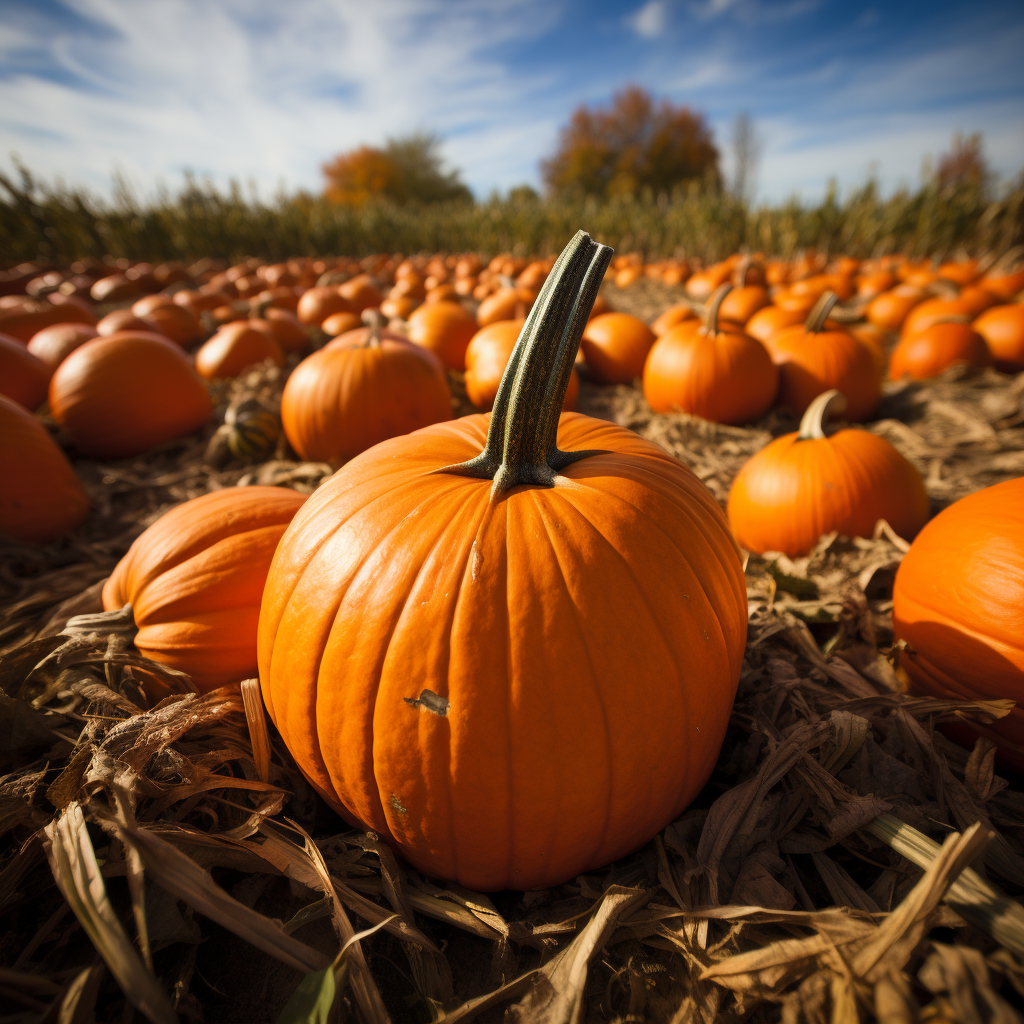
From silver screens to spooky tales, the Jack-o’-Lantern has etched its mark deep into pop culture. It’s not just a legend anymore; it’s an icon. Ever noticed its cameos in films or its influence in design?
Time to spotlight this pumpkin’s star-studded journey. Ready for the show?
Iconic Scenes in Movies and Literature
You know those moments when you’re tucked under a blanket, popcorn in hand, and suddenly there’s that unmistakable glow of a jack-o’-lantern in a movie scene? It’s more than just festive décor. Jack-o’-lanterns have lit up iconic moments in cinema and etched memories in literature. From the foreboding carved faces in horror flicks to the enchanting scenes in classic novels, these luminescent symbols have served as powerful visuals. Their subtle storytelling, evoking nostalgia, suspense, or romance, showcases just how influential a simple carved pumpkin can be in setting a mood. Next movie night, keep an eye out – you’ll be surprised how often these glowing faces steal the scene.
The Great Pumpkin: Celebrations and Festivals Across the U.S.
Ever wondered where the heart of jack-o’-lantern celebrations beats the loudest? Well, across the U.S., towns and cities elevate the humble pumpkin into show-stopping spectacles. Keene, New Hampshire, for instance, once held the record for the most lit jack-o’-lanterns on display. Festivals like these aren’t just about sheer numbers. They’re a canvas for artistic expression, with intricate carvings that would blow your mind. And let’s not forget the joyous pumpkin parades, where the main stars are, you guessed it, glowing jack-o’-lanterns. So next time October rolls around, maybe plan a road trip to dive deep into America’s pumpkin heartland. It’s an experience like no other.
Commercial Uses: From Advertising to Product Design
When Halloween swings around, have you ever noticed how the iconic jack-o’-lantern face seems to pop up everywhere? It’s not just for the festive vibes. Businesses recognize the strong, nostalgic appeal of the glowing pumpkin and have seamlessly woven it into advertising campaigns.
From your favorite coffee shop launching a limited edition “Pumpkin Spice” flavor to tech gadgets featuring spooky, pumpkin-themed skins, the commercial world loves to cash in on this trend. It’s a playful nod to tradition, and it sure does grab your attention in a bustling marketplace.
Global Inspirations: Similar Traditions Around the World
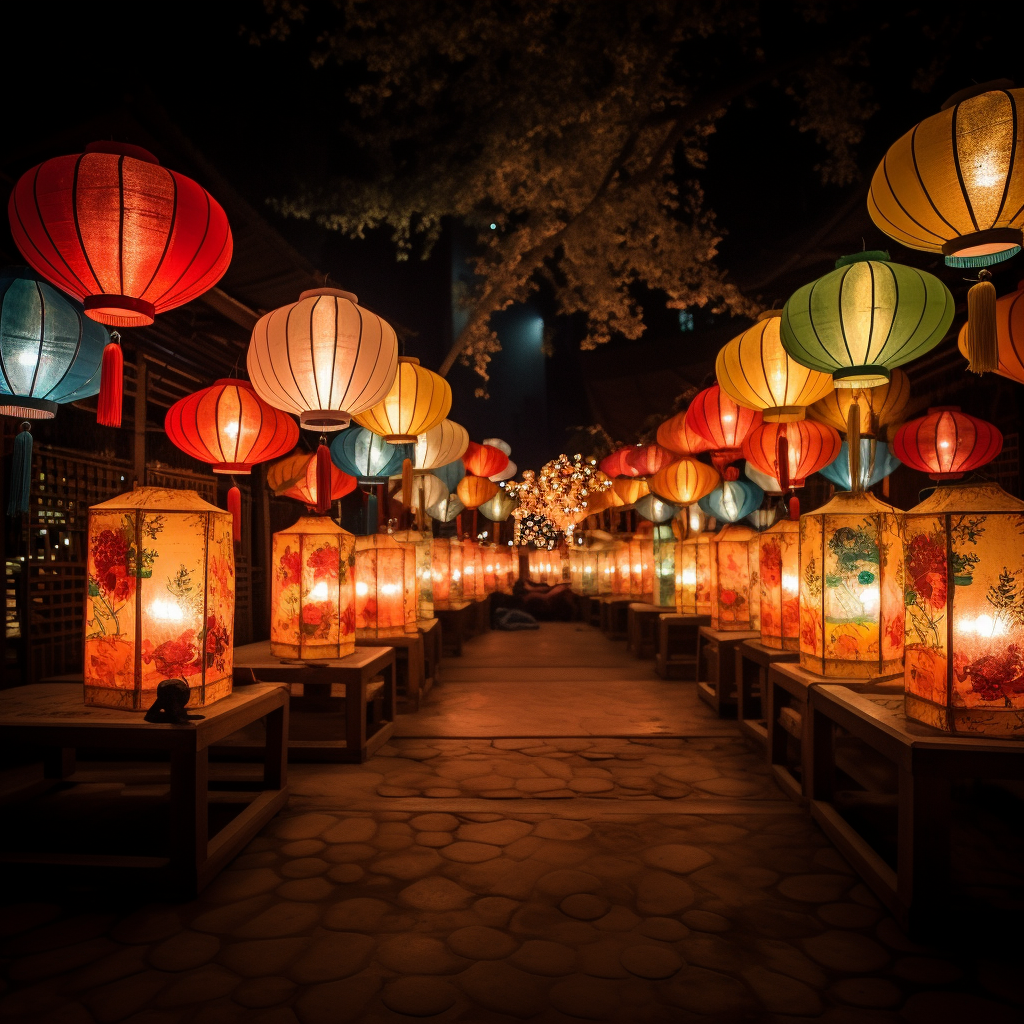
The Jack-o’-Lantern may have Irish roots, but similar traditions shimmer worldwide. From Asia’s lanterns to Europe’s twists, our pumpkin’s story isn’t solitary.
Ready for a global lantern tour?
The Mesoamerican Origins of the Pumpkin
Before pumpkins took center stage in Halloween celebrations, do you know where they originally hailed from? The pumpkin’s roots trace back to Mesoamerica, where ancient civilizations cultivated them long before they became a symbol of fall in the U.S. Rich archaeological evidence suggests that pumpkins, alongside beans and maize, were staple crops of the ancient Mayan, Aztec, and Olmec diets.
These vibrant squash weren’t just for munching on, though. The Mesoamericans utilized the entirety of the pumpkin – from its nutritious seeds to the durable shell which served as containers or tools. It’s a testament to the pumpkin’s versatility and longstanding importance in human history. A humble squash turned superstar!
Lantern Festivals in Asia: A Different Kind of Light
Asia’s lantern festivals light up the night differently than Western carved pumpkins. Think streets aglow with paper lanterns during China’s Mid-Autumn Festival or Thailand’s Yi Peng, symbolizing unity and gratitude. Beyond spooky faces, these events emphasize community and reflection, turning lanterns into beacons of hope in cultural celebrations of light.
European Variations: Roots in Other Mythologies
Europe’s lantern traditions are deeply rooted in varied mythologies. The UK has its carved turnips, while Italy’s “Strega Nona” uses her lantern to guide lost souls. Slavic tales speak of “Lysaya Baba,” a spirit using lanterns against winter’s chill. These tales highlight the diverse ways light plays a role in European folklore.
The Legacy of the Jack-o’-Lantern Today
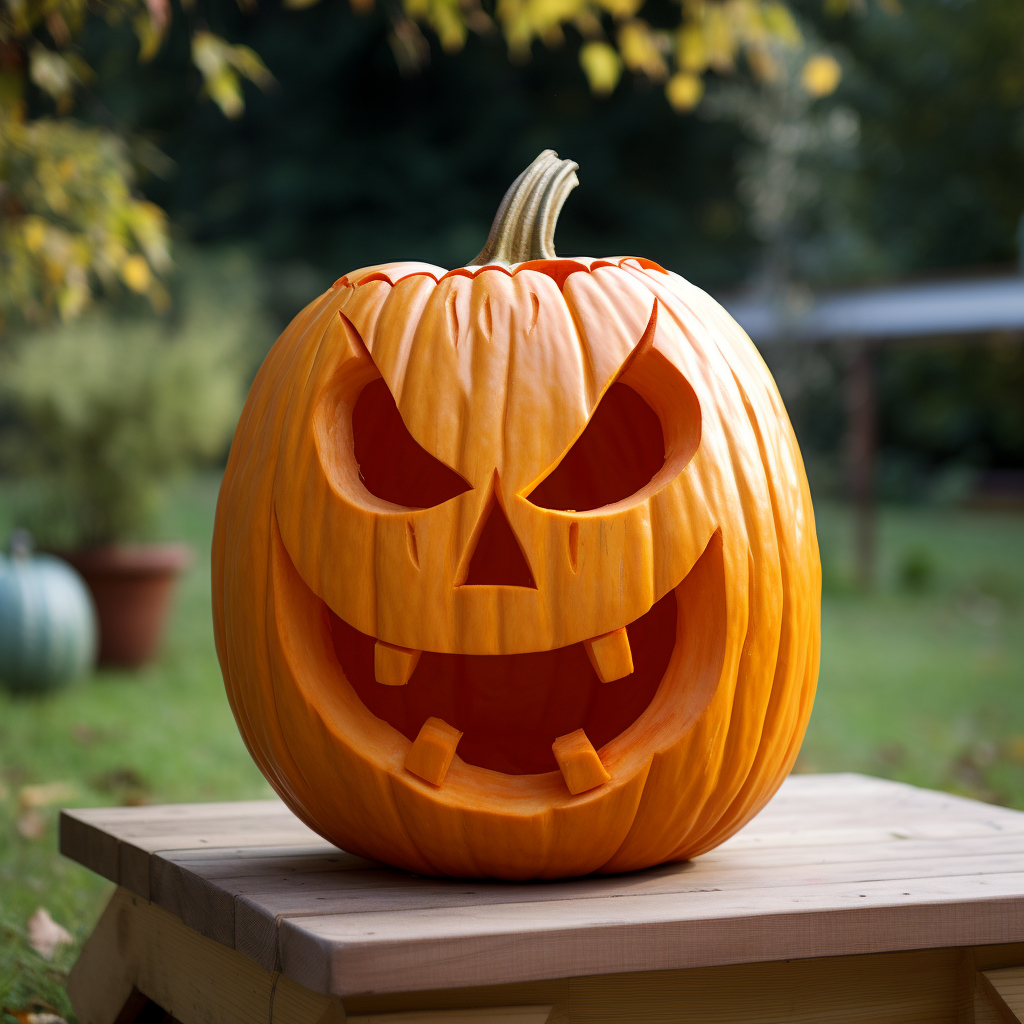
Today’s Jack-o’-Lantern is more than an ancient symbol; it’s a beacon of modern traditions and values. Ready to explore its contemporary impact?
Let’s dive in.
Today’s Jack-o’-Lantern is more than an ancient symbol; it’s a beacon of modern traditions and values. Ready to explore its contemporary impact? Let’s dive in.
Modern Day Celebrations and the Role of the Lantern
In today’s bustling urban landscapes, the allure of lanterns endures, especially in festivities. Think of them as a nostalgic nod to bygone eras. Festivals like Diwali and the Mid-Autumn Festival showcase streets aglow with lanterns, fusing tradition with modern aesthetics. They aren’t just luminous ornaments; they represent hope, unity, and the triumph of light over darkness.
But it’s not only about cultural festivals. Ever been to a beach party or a summer BBQ where lanterns set the mood? From hip rooftop bars to serene garden parties, the contemporary use of lanterns adds ambiance, guiding us through moments of celebration, much like they did for our ancestors in tales of old.
Environmental Considerations: Biodegradable Art
In an age where “going green” is more than just a buzzword, art doesn’t lag. You’ve probably seen those sky lantern festivals, right? While undeniably mesmerizing, they pose environmental concerns. But here’s the good news: innovative creators are crafting biodegradable lanterns, ensuring that our celebrations don’t compromise Mother Earth’s well-being. These eco-friendly alternatives break down naturally, leaving behind no trace. It’s heartwarming, really. We’re illuminating our nights while keeping the planet’s future bright. So next time you’re shopping for lanterns, maybe give those biodegradable options a second glance. Mother Earth will thank you.
Crafting Memories: Family Traditions and Storytelling
Ever noticed how lantern-making isn’t just about crafting an object, but crafting memories too? For many families, the process is steeped in tales from yesteryears, shared anecdotes, and nostalgic moments. You see, when families gather around to create lanterns, it’s more than just paper and light. It’s about stitching together stories, passing down traditions, and embedding love in each fold. So, next time you’re involved in such a tradition, listen closely. You’re not just hearing about how to make a lantern; you’re soaking in a legacy.
In the dance of shadows and light, lanterns have woven stories through cultures, histories, and hearts. From the eerie legends of Jack-o’-lanterns to the enchanting lantern festivals of Asia, you’ve journeyed through a tapestry of traditions and meanings. Whether it’s an age-old Irish carving method, a cinematic portrayal, or just a cherished family tradition, these glowing symbols represent so much more than mere decoration. As you light up your next lantern, remember the myriad tales it carries and perhaps, add a chapter of your own. Illuminate, celebrate, and keep the legacy glowing!

